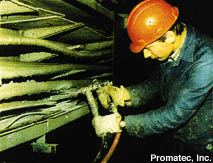| Previous: Shelter Renovation and Worker Safety Improvement | Next: The Chornobyl Center for Nuclear Safety, Radioactive Waste and Radioecology |
|
Operational Safety Improvements
Using a team of experts, the U.S. Department of Energy is working with Chornobyl plant personnel to improve operational safety and training at the plant until it can be shut down. Operator training courses are being provided in the United States and Ukraine. The U.S. experience in implementing improved practices for conduct of operations is shared through mentoring Chornobyl plant personnel and providing them with opportunities to visit U.S. nuclear power plants. During such visits, Ukrainian plant operators learn how management and operational control procedures at U.S. plants help eliminate human errors that could lead to an abnormal event.In the event of an abnormal plant event, emergency operating instructions are needed to ensure that nuclear power plant operators clearly understand the actions required to stabilize the reactor. The U.S. Department of Energy is helping the staff improve the Chornobyl plant emergency operating instructions by sharing the U.S. experience in developing procedures designed to respond to the first signs of an emergency. These instructions will be used in conjunction with a computerized safety parameter display system that provides plant safety information to control room operators and alerts them in the event of an emergency.
Operator training programs are being enhanced further by transferring information from U.S. pilot projects at Russia's Balakovo and Ukraine's Khmelnytskyy training centers. Basic training equipment also is provided to support these transferred programs. In addition, Chornobyl's management is working with the U.S. Department of Energy and U.S. companies to develop an analytical simulator for training control room operators. Analytical simulators use graphic displays and computer programs to mimic a variety of plant conditions so that control room operators can improve their response to routine and emergency situations. As part of this effort, computer hardware, operating system software, and software models for the Chornobyl Unit 3 plant systems are being provided, along with training to help the plant staff maintain and use the simulator effectively.
Fire safety upgrades are of particular importance
to the overall safety of the Chornobyl nuclear power plant. Chornobyl,
like many older Soviet-designed nuclear power plants, was equipped with
inadequate, wooden fire doors. Ukrainian and U.S. firms have collaborated
to manufacture fire doors at a Ukrainian factory that are certified to
international standards. More than 250 fire doors have been ordered, as
well as fire and smoke detectors, fire-retardant sealant barriers, and
firefighting equipment, such as firefighter suits and hose nozzles.
![]()
| Previous: Shelter Renovation and Worker Safety Improvement | Next: The Chornobyl Center for Nuclear Safety, Radioactive Waste and Radioecology |
 A control room operator practices
responding to routine and emergency conditions using a safety parameter
display system.
A control room operator practices
responding to routine and emergency conditions using a safety parameter
display system.  A plant worker
applies fireproofing material to an electrical cable tray.
A plant worker
applies fireproofing material to an electrical cable tray.